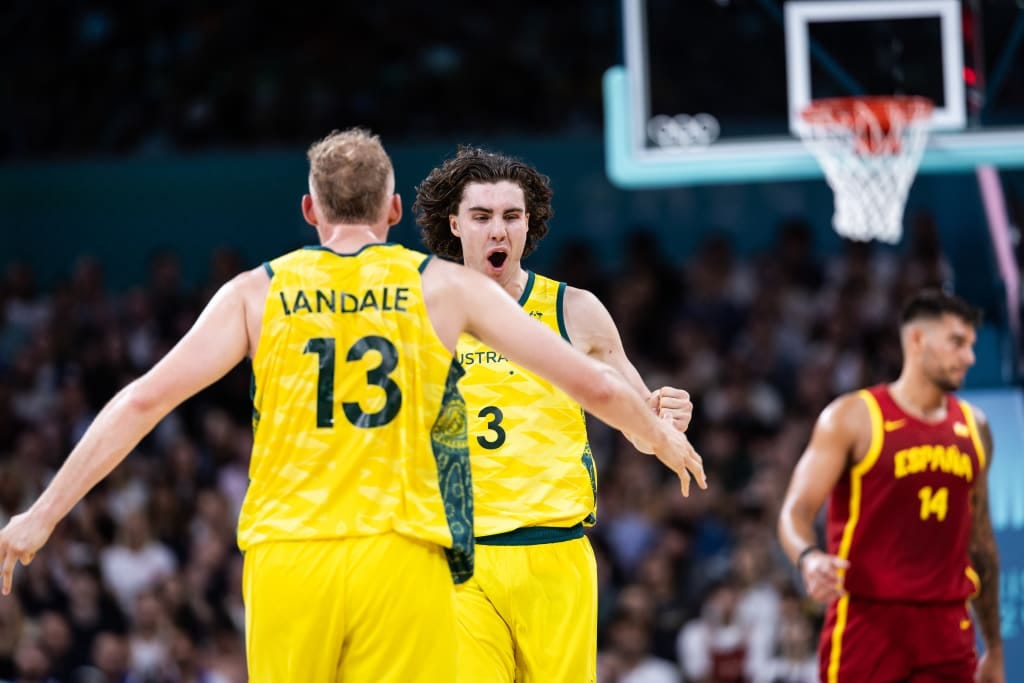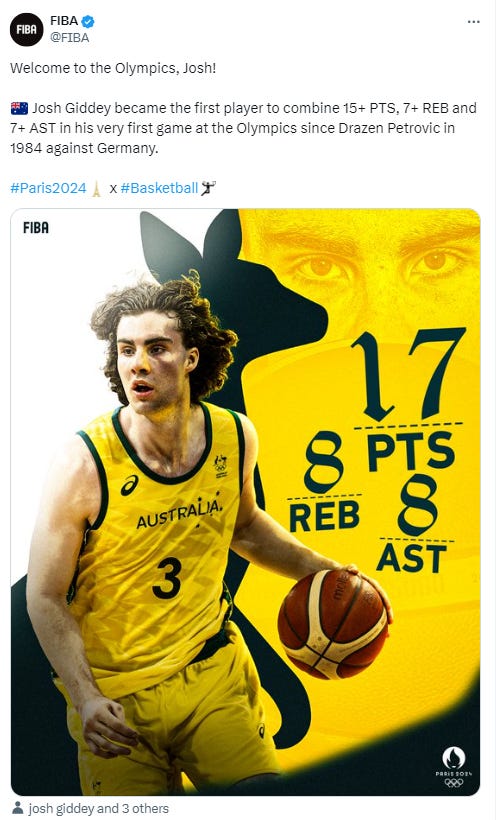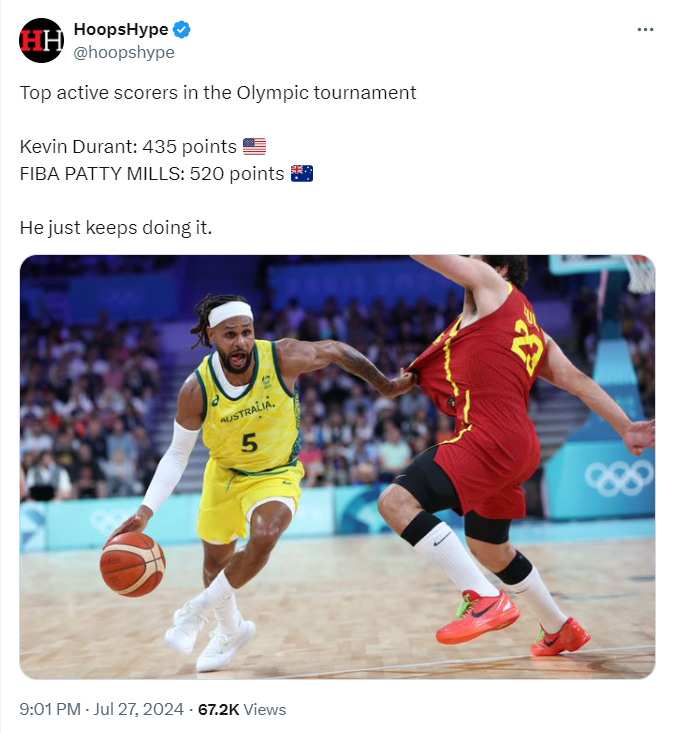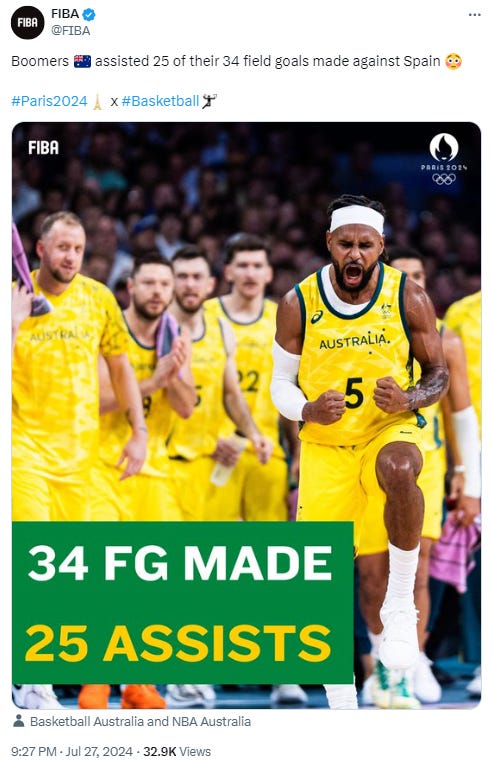Olympics: Four key takeaways from the Australian Boomers' win over Spain
Australia claimed an impressive win over arch-rival Spain to open their Olympic campaign, but they'll face an even bigger test tonight against Canada. Can they keep their winning momentum going?
Credit: FIBA
They say that bad things come in threes, and for just a moment, it looked like that might ring true for the Australian Boomers.
After devastating losses to Spain in the 2016 Olympics and the 2019 World Cup, they found themselves at a fork in the road once again in their Paris Olympics opener. Australia controlled most of the contest and led by 11 early in the final term, but back-to-back threes from Sergio Llull cut the margin to five and sent heart rates skyrocketing across the country. The 36-year-old had played a big role in both of those previous clashes; surely he couldn’t break Australian hearts once again. Even coach Brian Goorjian was on edge, as he told ESPN Australia following the game.
These Boomers weren’t about to allow history to repeat itself, though, peeling off a 9-0 run through the middle of the quarter and controlling the tempo late to secure a 92-80 win. In a game with plenty of feeling —and according to ESPN’s Kane Pitman, a healthy dose of trash talk— it was a win that was surely just as enjoyable for the players as the fans at home. There were brief lapses throughout, but on the whole, it was a clinical performance in what was essentially a must-win contest right out of the gate.
With a win under their belt, and some handy point differential to boot, the Boomers are now well positioned heading into tonight’s clash with Canada. A win there would secure progress to the quarter-finals, and while a loss wouldn’t be fatal, it could make for a tense final matchup with Greece depending on where other results fall.
1. Jock Landale stamps his authority
Australia flew out of the gates from the opening tip, quickly building a 21-9 lead inside the first six minutes thanks to some incredible offensive execution. It was a blur of movement, five players in constant motion and perfect harmony. Well-timed screens led to opportunistic cuts that were met with timely passes, and for a while there, it was a layup line. Put simply, it was beautiful basketball to watch.
The difference between that and last year’s FIBA World Cup, where the Boomers found themselves bogged down in stagnant offence for long stretches, was night and day. Just as clear was the main culprit behind that turnaround, highlighted as much by his absence in Okinawa as his presence now. At quarter time, Jock Landale had eight points and three assists as the fulcrum of Australia’s offence; by game’s end, he had piled on 20 points, nine rebounds and five assists, arguably his best performance for the national team.
Most impressive of all, was his ability to be exactly what the Boomers needed at all times. When they were firing on all cylinders in that first quarter burst, he played perfectly within the system, getting his touches in the flow of the offence and making the right reads. Josh Giddey got off to a flying start (more on that to come) in part thanks to the setup work of Landale as a screener and in dribble handoffs, with their partnership looming as one of the most dangerous in the whole tournament.
When Giddey rested for stretches in the second half and the easy baskets dried up, Landale took it upon himself to keep them afloat. After Spain made a run and took the lead midway through the third, he hit back-to-back buckets to help push the Boomers clear once again. Both came in the same fashion that long-time fans from Landale’s days as a Gael would recognise, from when he was known for his low-post prowess. Landale demanded the ball in the post and went to work, first on Santi Aldama and then on Usman Garuba, getting to his spot for an easy jump hook and score. It was a show of strength when his team needed it, and it highlighted his remarkable versatility, in being able to play with brute force or subtle skill and be supremely effective either way.
All of that will be crucial against a Canadian team that will look to unsettle Australia’s guard play at every opportunity. The Boomers are at their best when the ball is zipping around the through hands and to their cutters, but that won’t be so easy when faced with Luguentz Dort and Dillon Brooks. While both fouled out in Canada’s win over Greece, they still had a huge impact – Dort was +26 on the night, while Brooks was +24. They are elite disruptors on the perimeter, and there will undoubtedly be stretches of the game where they crank up the pressure and force the ball to stick a little more.
In those moments, Landale will need to dominate around the basket as he did against Spain. Canada’s biggest weakness is their big men – while Kelly Olynyk and Dwight Powell are NBA talents, they’re less imposing than some of the star-studded front lines in the tournament. If and when things dry up again, Landale’s ability to get down and dirty in the post and grind out scores will be crucial.
2. Giddey and Mills in perfect harmony
There were questions ahead of the tournament about whether Josh Giddey and Patty Mills could or should share the court. Those concerns were fair on paper – both have been at their best in the past with the ball in their hands and a long leash to create – and while both closed out Australia’s pre-tournament campaign in good form, the way to best utilise them was still a talking point.
If the win over Spain is anything to go by, Goorjian might have cracked the code. He pulled the strings masterfully with his substitutions across the board, and he rode the hot hand between Giddey and Mills as both played their part to perfection.
It was Giddey that led the way in their fast start, pouring in 11 points in the first quarter without missing a shot from the field. It’s remarkable how much confidence the 21-year-old is playing with, coming off an NBA season where he was routinely panned and ultimately traded. Maybe that’s an effect of the Boomers culture, or Goorjian’s coaching, or the FIBA game, but he has looked like an entirely different player. In that opening term, he showed off his full repertoire as a scorer, making a reverse layup off a backdoor cut, flashing his soft touch with a floater over Aldama, and knocking down a pair of threes shot without hesitation.
When he took a well-earned rest, sitting for five minutes in the third term and again early in the last, it was Mills that came to the fore with some big-time shot making. A 9-0 run from Spain saw them edge in front shortly after Giddey went to the bench in the third; it was a triple from Mills that steadied the ship, sparking a run of their own and giving them a lead that they wouldn’t relinquish again. By the final buzzer, both well and truly played their role. Mills finished with 19 points on 6-12 shooting, while Giddey stuffed the stat sheet with 17 points, eight rebounds and eight assists.
Goorjian’s defensive game plan is an intense one, particularly for the team’s guards as they press in the full court and try to force mistakes. Giddey and Mills need to play their part in that, and with a heavy offensive workload added in, it’s not sustainable for them to play huge minutes every night. By splitting them apart for stretches, Goorjian was able to maintain his side’s momentum offensively without giving up that defensive energy or burning out his stars, both of whom played less than 30 minutes. In fact, it was a well-balanced rotation across the board – of the 10 Boomers that hit the court, eight played double-figure minutes but none ticked over 30. In a long and gruelling tournament, that will be crucial.
As Giddey rose through the ranks and into the NBA, it became clear that he would eventually be the best player on the Boomers; what was less clear was if he could be “the guy”, a go-to scorer able to take and make shots when the going gets tough. That was answered in large part when he led the team in scoring at last year’s World Cup, but he looks to have gone to another level again now. With Mills seemingly back to his best, the Boomers have the luxury of elite guard play at all times, and two unique looks running the point.
That’s something that not many teams have in their arsenal, although Australia’s next opponent is one of the few. Not only will Giddey and Mills be faced with Brooks and Dort at one end of the floor, but they’ll have to work doubly hard defensively against Shai Gilgeous-Alexander and RJ Barrett. The two NBA stars will head into tonight's clash full of confidence after combining for 44 points against Greece, and while Dyson Daniels and Josh Green will take the direct matchups, it will take a whole-of-squad effort to slow them down.
3. Boomers get the game on their terms
Through all of their warmup games, and even back to last year’s World Cup, Australia’s MO has been clear – get stops, get out and run, get easy buckets. It didn’t quite click in Okinawa, but they did a good job in their pre-Olympic fixtures of forcing mistakes and pushing in transition wherever possible. Still, stepping up into tournament play presented another test, particularly against a Spanish team that would rather slow the game down and work in the half-court.
In the end, it was a test that they passed with flying colours. The game was played at a breakneck speed, at least relative to most FIBA tournaments, with the Boomers winning the fast break points 18-5 and regularly getting a running start in the half-court after missed shots and turnovers. On the flip side, the Spanish were constantly frustrated by the physical defence of the Boomers, and in a game with plenty of emotion they struggled to ever settle into a rhythm.
That started with the incredible defence of both Dyson Daniels and Josh Green, who picked up Spain’s guards at full court and hounded them relentlessly. That pressure didn’t always result in a turnover, but it often delayed Spain’s half-court sets; instead of initiating the action with 20 seconds to work with, they suddenly had 16. It clearly took a toll on their guards – while Llull threatened to get off the chain he finished the game shooting 7-17 from the field and 5-15 from three, and Lorenzo Brown had seven turnovers and scored just seven points.
It’s a high-risk, high-reward style that the Boomers play, as broken down by Marc Campbell for The Pick and Roll last week. Out of that full-court press from the guards, they hedge hard on screens and try to force a rushed decision to take the opposition out of their set. Its shortcomings were clear at times against Spain, with Santi Aldama in particular getting some wide-open looks from the perimeter on his way to 27 points and six made triples. The whole Spanish team found openings to fire from the perimeter but shot just 12-37 from three; some of that was good defensive scrambling and recovery from the Boomers, but some were just players missing open shots.
It’s the same story offensively, where Australia was able to push the tempo but came undone at times while trying to do so. The Boomers have multiple playmakers on the court at all times — Giddey, Mills, Daniels and Dellavedova have all spent time in their careers as point guards, as has Danté Exum when he returns, Ingles and Kay can make plays from the forward spots, and Jock Landale has proven to be a good passer from the high or low post. They can all see passing lanes and are confident enough to bite them off on the fly, which is an overall positive but has led to some high-turnover games.
Across their four warmup games against Olympic competition, the Boomers had more turnovers than assists; it wasn’t nearly as drastic against Spain, where they finished with 16 turnovers, but that’s still a high number that they’d love to whittle down. The positives outweighed the negatives, though, as they piled on 92 points against a high-level team and tallied 25 assists on 34 field goals.
With such an aggressive style of play on both ends, everything is a tradeoff. So far, the Boomers have been able to limit the bad and accentuate the good, with the team Goorjian picked delivering in spades and executing his plan well. It’ll be a whole new challenge against Canada, though, with a roster almost entirely made up of players used to the run and gun of NBA basketball and an NBA head coach at the helm in Jordi Fernández.
Daniels and Green have been incredible, but can even they speed up Gilgeous-Alexander and get him out of his comfort zone? Will Mills and Giddey be able to break free from the shackles of Brooks and Dort to get out and run, or will they be stifled in the way that Australia stifled Spain? It’ll be fascinating to see how it unfolds.
4. Fighting through adversity
Perhaps the most promising signs of all from this game came from Australia’s lowest moments. They didn’t have it all their own way; Spain threw some haymakers and landed a couple, roaring back into the contest with some hot shooting and general agitation.
The way the Boomers responded, absorbing those blows and then hitting back twice as hard, bodes well for their prospects moving forward. In a tournament stacked with talent, they’ll never be on top for all 40 minutes of any game, particularly should they advance deep into the knockout stages. That they refused to crumble under pressure maybe shouldn’t be a surprise given the experience on the court and the sidelines, but it was reassuring nonetheless.
That goes for the team as a whole, but also the individual players that faced their own adversity throughout. Jack McVeigh battled defensively early, getting caught a step late on a couple of rotations and committing a pair of inexcusable fouls on three-point shooters; Goorjian kept the faith in him and kept him on the court, and he hit some huge shots in the second half to help ice the game. Nick Kay found himself in foul trouble early and was forced to the bench; when he came back in, he was as steady as ever on both ends. Giddey and Mills had five turnovers apiece, but they kept attacking and getting to their spots, and it paid off in all the biggest moments.
A murderer’s row of pre-Olympic opponents has so far paid off in spades. The rust was shaken off with some glorified tryouts against China, the iron was sharpened in a loss to Team USA, and the finishing touches put on with wins over fellow Olympians Puerto Rico, Serbia and France. That left the Boomers in good shape from the first second of this tournament, maybe not quite at their very best, but close enough to touch it.
As tonight’s huge matchup with Canada fast approaches, it’s reassuring to have seen the Boomers stay strong with their backs against the wall. They’ll find themselves in a hole at some stage, and with so much talent against them, they could fall into it fast. They’ve shown good resolve so far; now comes their biggest test to date.






